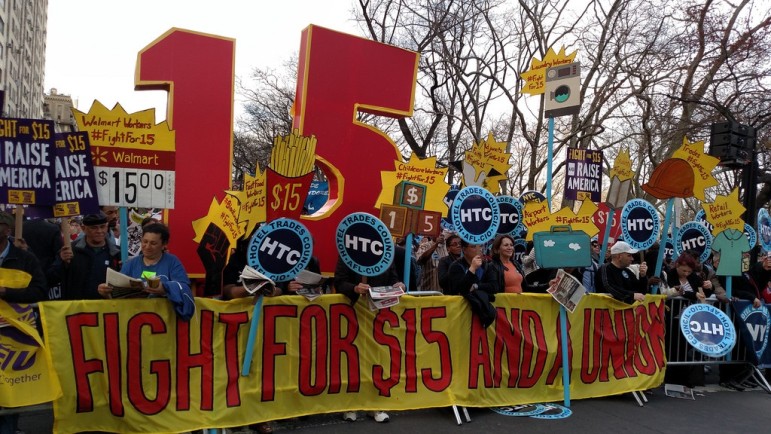
August 27, 2015; New York Times
The Fight for $15 movement began in 2012, as airport workers with wages of $20 an hour plus benefits tried to form a union. Instead, their jobs were reconfigured into minimum wage opportunities literally overnight. Since that time, the national minimum wage has remained at $7.25, and union membership has continued to decline, reaching 11.1 percent of workers in 2014. But on the local level, Fight for $15 has successfully advocated for minimum wage increases in twenty-nine states plus many large municipalities. Additionally, in the last two weeks, two court decisions were published expanding workers right to organize and increasing the jurisdiction of a regulation designed to require employers to pay workers more of a living wage.
Last week, The National Labor Relations Board announced a ruling in favor of unions negotiating on behalf of low-wage workers. The much-anticipated decision will allow workers at franchises (such as McDonald’s) or employed at subcontractors connected to larger employers to negotiate together with workers of other franchises or directly with the large employer. By creating an opportunity for low-wage workers to bargain collectively, the worker gains power and unions can coalesce.
The ruling stems from a dispute between a garbage disposal and recycling company, California-based Browning-Ferris, and its subcontractor, which employed workers to staff the recycling center. Browning-Ferris maintained the right to set criteria for hiring and firing as well as dictating the amount workers would be compensated. At the time of the dispute, workers were voting on whether to unionize. The NLRB panel ruled that since Browning-Ferris “maintained control of the workplace,” the workers were joint employees of the subcontractor and Browning-Ferris. Therefore, Browning-Ferris could not insulate itself from the legal responsibilities it had to the workers by creating a subcontractor employer. By acknowledging this relationship, the Board allows workers to sue the corporation, which has more resources, rather than a subcontractor that often has less.
Sign up for our free newsletters
Subscribe to NPQ's newsletters to have our top stories delivered directly to your inbox.
By signing up, you agree to our privacy policy and terms of use, and to receive messages from NPQ and our partners.
Through this decision, the Board modified the employer-employee relationship developed in the Reagan era of the 1980s. In the past, a company had a relationship with a worker only if it had “direct and immediate” control over the working environment. Now, the parent company has a responsibility to the worker even it if only requires the subcontractor to use certain software that limits the number of hours or length of a workers’ shift, or maintains the right to control such workplace conditions but does not exercise them. An appeal is expected, but although a win might only apply to a particular franchisee or division, it would increase the leverage of workers at other locations.
The ruling follows a decision by the Washington State Supreme Court the week before in favor of workers at the Seattle-Tacoma International Airport, located in the small community of SeaTac. In 2013, unions and nonprofits fought successfully for Proposition #1, making SeaTac the first city in America to require employers to pay workers a minimum of $15 an hour. Airlines and their contractors argued the proposition does not apply to the international airport, since it is under the jurisdiction of the Port of Seattle rather than the city. The Court majority ruled that the Port of Seattle only maintains control of airport operation, and as long as Proposition #1 does not “interfere” with operations, it is enforceable.
The Fight for $15 began during the Great Recession and quickly expanded through a series of strikes by fast-food workers frustrated by the growth in low-wage employment and the increase in the cost of living in many cities. Many outside of the movement often incorrectly stereotype the minimum wage worker. Currently, 56 percent of workers earning the minimum wage are women and 53 percent are white. Additionally, 53 percent of these workers have their high school diploma and only 33 percent are under the age of 25. With the latest court decisions, union membership may grow, further expanding the movement’s power.—Gayle Nelson













